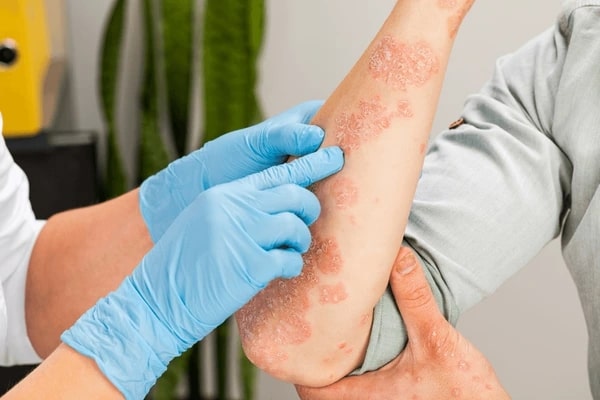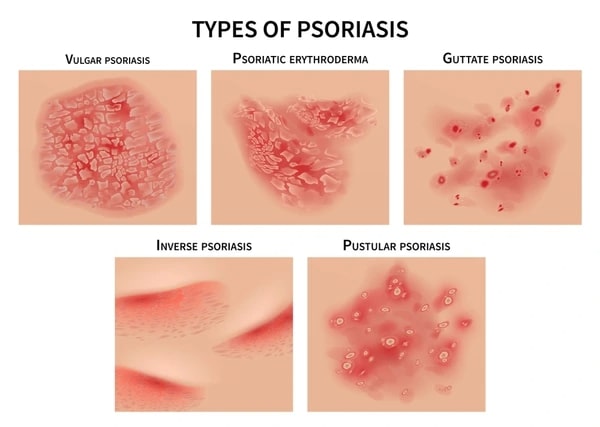What is Psoriasis: Symptoms, Causes, Types & Treatment by Dr. Sweta Vijay Nakhwa, Best dermatologist in Thane West.
Psoriasis is a chronic skin condition that affects millions of people worldwide. Characterized by red, scaly patches on the skin, it can significantly impact a person’s quality of life. Understanding psoriasis is crucial for effective management and treatment.
This comprehensive guide, informed by the expertise of Dr. Sweta Vijay Nakhwa, a leading dermatologist in Thane West, aims to shed light on the symptoms, causes, types, and treatments of psoriasis.

What is Psoriasis?
Psoriasis is an autoimmune disease that causes rapid skin cell production, leading to thick, red, scaly patches. These patches, or plaques, can appear anywhere on the body but are commonly found on the scalp, elbows, knees, and lower back.
Psoriasis is not contagious, but it can be hereditary, suggesting a genetic component.
The condition often cycles through periods of remission and flare-ups, greatly affecting the patient’s physical and emotional well-being.
Symptoms of Psoriasis
Common Symptoms
- Red patches of skin covered with thick, silvery scales: These plaques are the hallmark of psoriasis and can vary in size and severity.
- Dry, cracked skin that may bleed: The affected areas can become very dry and prone to cracking and bleeding.
- Itching, burning, or soreness: These sensations can range from mild to severe and can significantly disrupt daily activities.
Less Common Symptoms
- Thickened, pitted, or ridged nails: Psoriasis can also affect the nails, causing them to become thick and ridged or develop pits.
- Swollen and stiff joints: Psoriatic arthritis, a related condition, can cause joint pain and swelling.
These symptoms can appear on various parts of the body, including:
- Scalp
- Elbows and knees
- Lower back
- Genitals and buttocks
- Nails
- Other areas (can vary)
Causes of Psoriasis
Genetic Factors
Psoriasis tends to run in families, suggesting a genetic predisposition. Certain genes have been linked to the disease, and having a family member with psoriasis increases the likelihood of developing the condition.
Immune System Dysfunction
Psoriasis is primarily an immune-mediated condition. T cells, which typically protect the body against infections, mistakenly attack healthy skin cells.
This immune response leads to the rapid production of new skin cells, causing the characteristic plaques.
Environmental Triggers
Various environmental factors can trigger or exacerbate psoriasis, including:
- Stress: High stress levels can trigger flare-ups.
- Skin injuries and infections: Cuts, scrapes, and infections can provoke psoriasis patches.
- Certain medications: Drugs like lithium, beta-blockers, and antimalarials can worsen the condition.
- Weather conditions: Cold, dry weather can lead to flare-ups, while sunlight may improve symptoms for some.

Exploring the Different Types of Psoriasis
Psoriasis can manifest in various forms, each with its unique characteristics:
- Plaque Psoriasis (Most Common): This is the most prevalent type, characterized by thick, red plaques covered with silvery white scales. It commonly affects the elbows, knees, scalp, and lower back.
- Guttate Psoriasis: This type presents with small, red, teardrop-shaped lesions. Often triggered by a strep throat infection, it typically appears suddenly in children and young adults.
- Pustular Psoriasis: This form features white pustules on red, inflamed skin. It can be localized (affecting a small area) or generalized (widespread).
- Erythrodermic Psoriasis: This severe form involves widespread redness, peeling, and scaling of the skin. It requires immediate medical attention.
- Inverse Psoriasis: This type causes smooth, red, inflamed patches to develop in skin folds like armpits and groin.
- Psoriatic Arthritis: This condition combines psoriasis with joint pain, stiffness, and swelling.
Psoriasis Treatment
Topical Treatments
Topical treatments are often the first line of defence against psoriasis. These include:
Corticosteroids: Reduce inflammation and slow cell turnover.
Vitamin D analogues: Slow down the growth of skin cells.
Retinoids: Help normalize DNA activity in skin cells.
Phototherapy
Phototherapy involves exposing the skin to ultraviolet light under medical supervision. Types include:
UVB therapy: Effective for treating widespread psoriasis.
PUVA therapy: Combines UVA light with psoralen, a drug that makes the skin more sensitive to light.
Systemic Medications
For moderate to severe psoriasis, systemic medications may be necessary. These include:
Oral medications: Such as methotrexate, cyclosporine, and acitretin.
Injectable medications (Biologics): Target specific parts of the immune system. Common biologics include adalimumab, etanercept, and Ustekinumab.
Lifestyle and Home Remedies
Managing psoriasis also involves lifestyle adjustments:
- Healthy diet and regular exercise: Can help reduce inflammation and improve overall health.
- Stress management techniques: Such as meditation, yoga, and counselling.
- Moisturizing and skin care: Regular use of moisturizers can prevent dry skin and reduce itching.

When to See a Dermatologist
If you notice symptoms of psoriasis, it’s essential to consult a dermatologist. Signs that professional help is needed include:
- Widespread patches of red, scaly skin.
- Painful or swollen joints.
- Symptoms that interfere with daily life.
Dr. Sweta Vijay Nakhwa, a renowned dermatologist in Thane West, offers personalized treatment plans and advanced care for psoriasis patients.
Best Dermatologist Doctor in Thane West
Dr. Sweta Vijay Nakhwa is a highly qualified dermatologist with extensive experience in treating psoriasis. She is known for her compassionate care and expertise in managing skin conditions.
Why Choose Dr. Sweta Vijay Nakhwa?
- Personalized Treatment Plans: Tailored to each patient’s specific needs.
- Advanced Treatment Options: Access to the latest therapies and technologies.
- Patient Testimonials and Success Stories: Positive feedback from numerous satisfied patients.
Conclusion
Understanding and managing psoriasis is crucial for improving quality of life. By recognizing the symptoms, knowing the causes, and exploring various treatment options, individuals can better manage this chronic condition.
Seeking help from an expert like Dr. Sweta Vijay Nakhwa in Thane West can make a significant difference in effectively controlling psoriasis and enhancing overall well-being.
